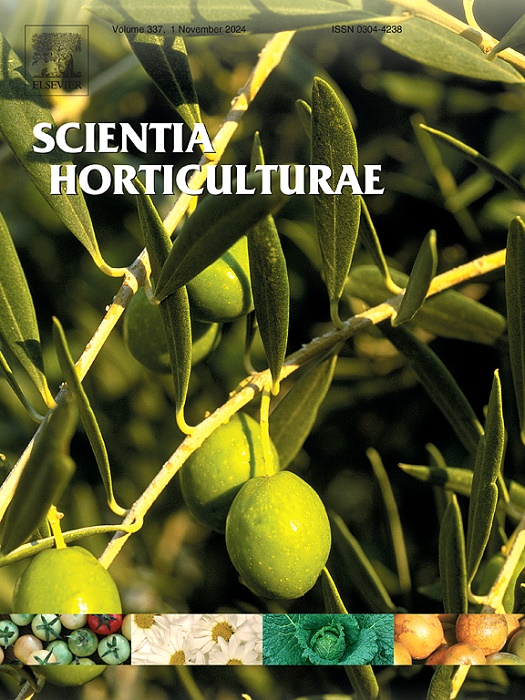Comparative transcriptome analysis of alkali stress on rhododendron tolerant and sensitive roots to identify alkali tolerance-related genes
IF 4.2
2区 农林科学
Q1 HORTICULTURE
引用次数: 0
Abstract
Rhododendrons prefer acidic soil, and soil alkalinity is a critical limiting factor for their growth. However, several varieties of rhododendron demonstrate exceptional adaptabilities to alkaline stress. This study aimed to elucidate the molecular mechanisms underlying alkali tolerance by comparing alkali-tolerant and -sensitive rhododendron varieties at the transcriptomic level, thereby providing insights to facilitate the breeding of improved alkali-tolerant cultivars. Using RNA-Seq, we analyzed differentially expressed genes (DEGs) at 0, 6, and 24 hours following alkaline stress. The results showed that the number of DEGs in the alkali-tolerant variety in response to alkali stress was 1.6 times that of the alkali-sensitive variety. In total, 212 and 781 common DEGs were identified within and between the alkali-tolerant and -sensitive variety, respectively, in response to alkaline stress. Gene Ontology and Kyoto Encyclopedia of Genes and Genomes enrichment analyses revealed that CYP genes, plant-specific class III peroxidases, and MPK3 play key roles in the alkaline stress response and displayed distinct expression patterns across varieties. Furthermore, numerous transcription factors (TFs) responsive to alkaline stress were identified, with AP2/ERF TFs being the most abundant. Notably, most AP2/ERF TFs were significantly upregulated in the alkali-tolerant variety after 24 hours of alkaline treatment. Functional validation demonstrated that overexpression of RpMPK3 enhanced alkali tolerance in Arabidopsis. In conclusion, this study provided a comprehensive set of candidate genes associated with alkali tolerance in rhododendron and highlighted the positive role of RpMPK3 in conferring this trait. These findings established a theoretical foundation for future molecular breeding of highly alkali-tolerant varieties of rhododendrons.
碱胁迫对杜鹃花耐碱根和敏感根的比较转录组分析,鉴定耐碱相关基因
杜鹃花喜欢酸性土壤,土壤碱度是其生长的关键限制因素。然而,一些品种的杜鹃花表现出对碱性胁迫的特殊适应性。本研究旨在通过比较耐碱和敏感杜鹃花品种在转录组水平上的差异,阐明耐碱的分子机制,从而为选育耐碱改良品种提供参考。使用RNA-Seq,我们分析了碱性胁迫后0、6和24小时的差异表达基因(DEGs)。结果表明,耐碱品种在碱胁迫下的deg数量是碱敏感品种的1.6倍。在碱胁迫下,耐碱品种内部和敏感品种之间分别鉴定出212个和781个共同deg。基因本体和京都基因与基因组富集分析表明,CYP基因、植物特异性III类过氧化物酶和MPK3基因在碱胁迫响应中起关键作用,并在不同品种间表现出不同的表达模式。此外,我们还发现了许多响应碱性胁迫的转录因子(tf),其中AP2/ERF tf最为丰富。值得注意的是,耐碱品种在碱性处理24小时后,大多数AP2/ERF TFs显著上调。功能验证表明,过表达RpMPK3增强了拟南芥的耐碱能力。综上所述,本研究提供了一套完整的与杜鹃花耐碱相关的候选基因,并强调了RpMPK3在赋予这一性状中的积极作用。这些发现为今后高耐碱杜鹃花品种的分子选育奠定了理论基础。
本文章由计算机程序翻译,如有差异,请以英文原文为准。
求助全文
约1分钟内获得全文
求助全文
来源期刊

Scientia Horticulturae
农林科学-园艺
CiteScore
8.60
自引率
4.70%
发文量
796
审稿时长
47 days
期刊介绍:
Scientia Horticulturae is an international journal publishing research related to horticultural crops. Articles in the journal deal with open or protected production of vegetables, fruits, edible fungi and ornamentals under temperate, subtropical and tropical conditions. Papers in related areas (biochemistry, micropropagation, soil science, plant breeding, plant physiology, phytopathology, etc.) are considered, if they contain information of direct significance to horticulture. Papers on the technical aspects of horticulture (engineering, crop processing, storage, transport etc.) are accepted for publication only if they relate directly to the living product. In the case of plantation crops, those yielding a product that may be used fresh (e.g. tropical vegetables, citrus, bananas, and other fruits) will be considered, while those papers describing the processing of the product (e.g. rubber, tobacco, and quinine) will not. The scope of the journal includes all horticultural crops but does not include speciality crops such as, medicinal crops or forestry crops, such as bamboo. Basic molecular studies without any direct application in horticulture will not be considered for this journal.
 求助内容:
求助内容: 应助结果提醒方式:
应助结果提醒方式:


